Globalization Has Diminished Nationalism | Report
VerifiedAdded on 2022/08/13
|8
|1894
|15
AI Summary
Contribute Materials
Your contribution can guide someone’s learning journey. Share your
documents today.
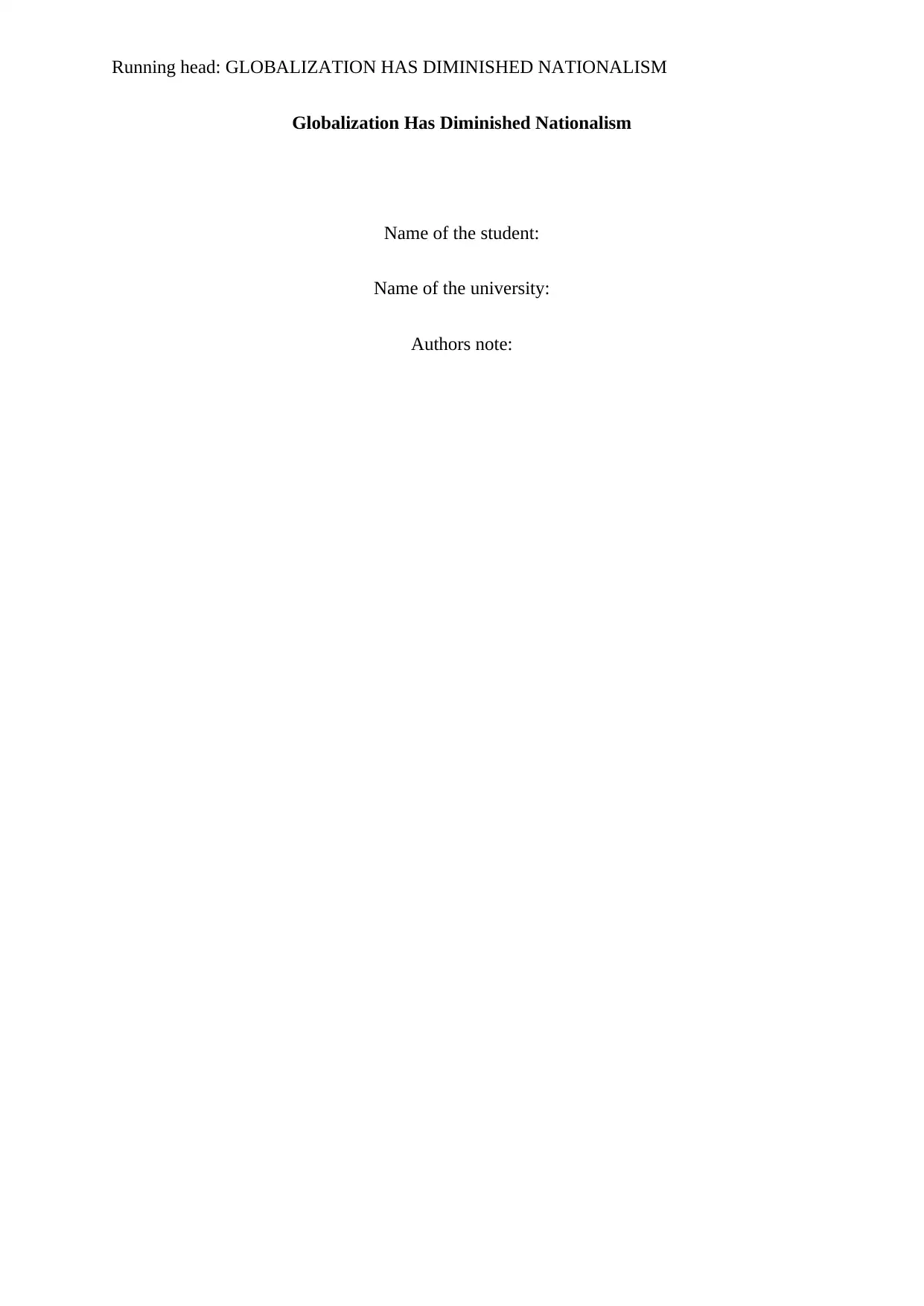
Running head: GLOBALIZATION HAS DIMINISHED NATIONALISM
Globalization Has Diminished Nationalism
Name of the student:
Name of the university:
Authors note:
Globalization Has Diminished Nationalism
Name of the student:
Name of the university:
Authors note:
Secure Best Marks with AI Grader
Need help grading? Try our AI Grader for instant feedback on your assignments.
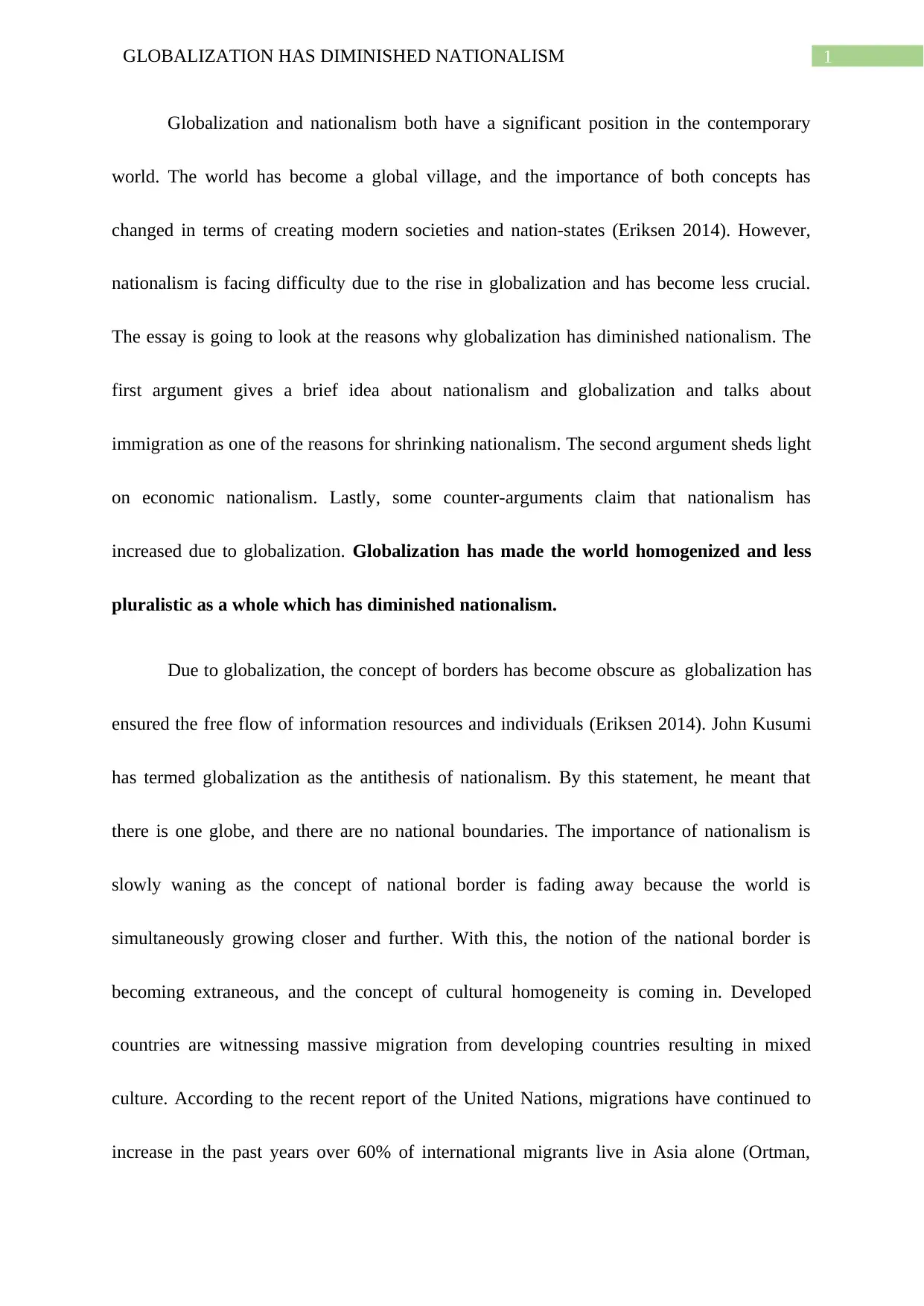
1GLOBALIZATION HAS DIMINISHED NATIONALISM
Globalization and nationalism both have a significant position in the contemporary
world. The world has become a global village, and the importance of both concepts has
changed in terms of creating modern societies and nation-states (Eriksen 2014). However,
nationalism is facing difficulty due to the rise in globalization and has become less crucial.
The essay is going to look at the reasons why globalization has diminished nationalism. The
first argument gives a brief idea about nationalism and globalization and talks about
immigration as one of the reasons for shrinking nationalism. The second argument sheds light
on economic nationalism. Lastly, some counter-arguments claim that nationalism has
increased due to globalization. Globalization has made the world homogenized and less
pluralistic as a whole which has diminished nationalism.
Due to globalization, the concept of borders has become obscure as globalization has
ensured the free flow of information resources and individuals (Eriksen 2014). John Kusumi
has termed globalization as the antithesis of nationalism. By this statement, he meant that
there is one globe, and there are no national boundaries. The importance of nationalism is
slowly waning as the concept of national border is fading away because the world is
simultaneously growing closer and further. With this, the notion of the national border is
becoming extraneous, and the concept of cultural homogeneity is coming in. Developed
countries are witnessing massive migration from developing countries resulting in mixed
culture. According to the recent report of the United Nations, migrations have continued to
increase in the past years over 60% of international migrants live in Asia alone (Ortman,
Globalization and nationalism both have a significant position in the contemporary
world. The world has become a global village, and the importance of both concepts has
changed in terms of creating modern societies and nation-states (Eriksen 2014). However,
nationalism is facing difficulty due to the rise in globalization and has become less crucial.
The essay is going to look at the reasons why globalization has diminished nationalism. The
first argument gives a brief idea about nationalism and globalization and talks about
immigration as one of the reasons for shrinking nationalism. The second argument sheds light
on economic nationalism. Lastly, some counter-arguments claim that nationalism has
increased due to globalization. Globalization has made the world homogenized and less
pluralistic as a whole which has diminished nationalism.
Due to globalization, the concept of borders has become obscure as globalization has
ensured the free flow of information resources and individuals (Eriksen 2014). John Kusumi
has termed globalization as the antithesis of nationalism. By this statement, he meant that
there is one globe, and there are no national boundaries. The importance of nationalism is
slowly waning as the concept of national border is fading away because the world is
simultaneously growing closer and further. With this, the notion of the national border is
becoming extraneous, and the concept of cultural homogeneity is coming in. Developed
countries are witnessing massive migration from developing countries resulting in mixed
culture. According to the recent report of the United Nations, migrations have continued to
increase in the past years over 60% of international migrants live in Asia alone (Ortman,
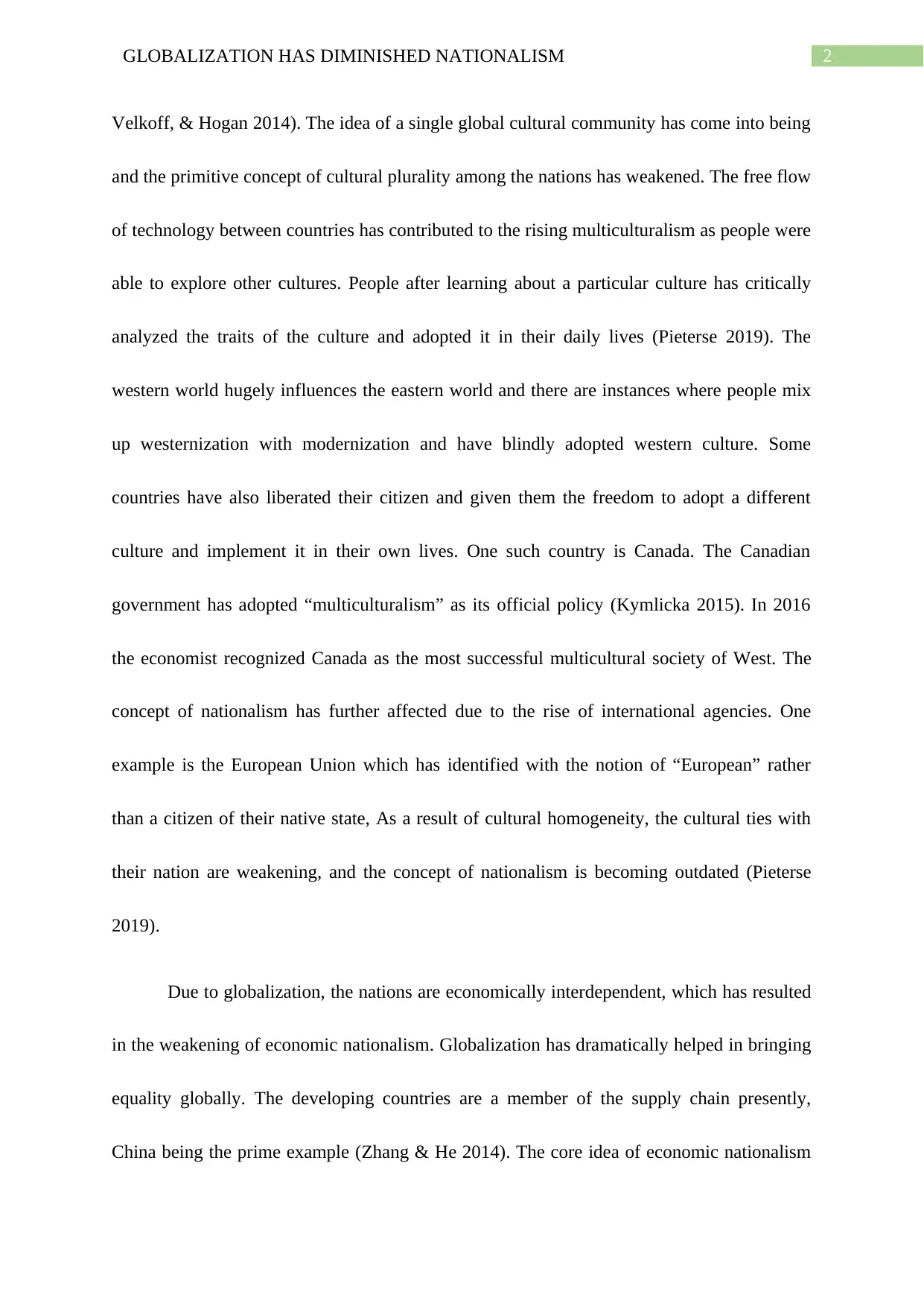
2GLOBALIZATION HAS DIMINISHED NATIONALISM
Velkoff, & Hogan 2014). The idea of a single global cultural community has come into being
and the primitive concept of cultural plurality among the nations has weakened. The free flow
of technology between countries has contributed to the rising multiculturalism as people were
able to explore other cultures. People after learning about a particular culture has critically
analyzed the traits of the culture and adopted it in their daily lives (Pieterse 2019). The
western world hugely influences the eastern world and there are instances where people mix
up westernization with modernization and have blindly adopted western culture. Some
countries have also liberated their citizen and given them the freedom to adopt a different
culture and implement it in their own lives. One such country is Canada. The Canadian
government has adopted “multiculturalism” as its official policy (Kymlicka 2015). In 2016
the economist recognized Canada as the most successful multicultural society of West. The
concept of nationalism has further affected due to the rise of international agencies. One
example is the European Union which has identified with the notion of “European” rather
than a citizen of their native state, As a result of cultural homogeneity, the cultural ties with
their nation are weakening, and the concept of nationalism is becoming outdated (Pieterse
2019).
Due to globalization, the nations are economically interdependent, which has resulted
in the weakening of economic nationalism. Globalization has dramatically helped in bringing
equality globally. The developing countries are a member of the supply chain presently,
China being the prime example (Zhang & He 2014). The core idea of economic nationalism
Velkoff, & Hogan 2014). The idea of a single global cultural community has come into being
and the primitive concept of cultural plurality among the nations has weakened. The free flow
of technology between countries has contributed to the rising multiculturalism as people were
able to explore other cultures. People after learning about a particular culture has critically
analyzed the traits of the culture and adopted it in their daily lives (Pieterse 2019). The
western world hugely influences the eastern world and there are instances where people mix
up westernization with modernization and have blindly adopted western culture. Some
countries have also liberated their citizen and given them the freedom to adopt a different
culture and implement it in their own lives. One such country is Canada. The Canadian
government has adopted “multiculturalism” as its official policy (Kymlicka 2015). In 2016
the economist recognized Canada as the most successful multicultural society of West. The
concept of nationalism has further affected due to the rise of international agencies. One
example is the European Union which has identified with the notion of “European” rather
than a citizen of their native state, As a result of cultural homogeneity, the cultural ties with
their nation are weakening, and the concept of nationalism is becoming outdated (Pieterse
2019).
Due to globalization, the nations are economically interdependent, which has resulted
in the weakening of economic nationalism. Globalization has dramatically helped in bringing
equality globally. The developing countries are a member of the supply chain presently,
China being the prime example (Zhang & He 2014). The core idea of economic nationalism
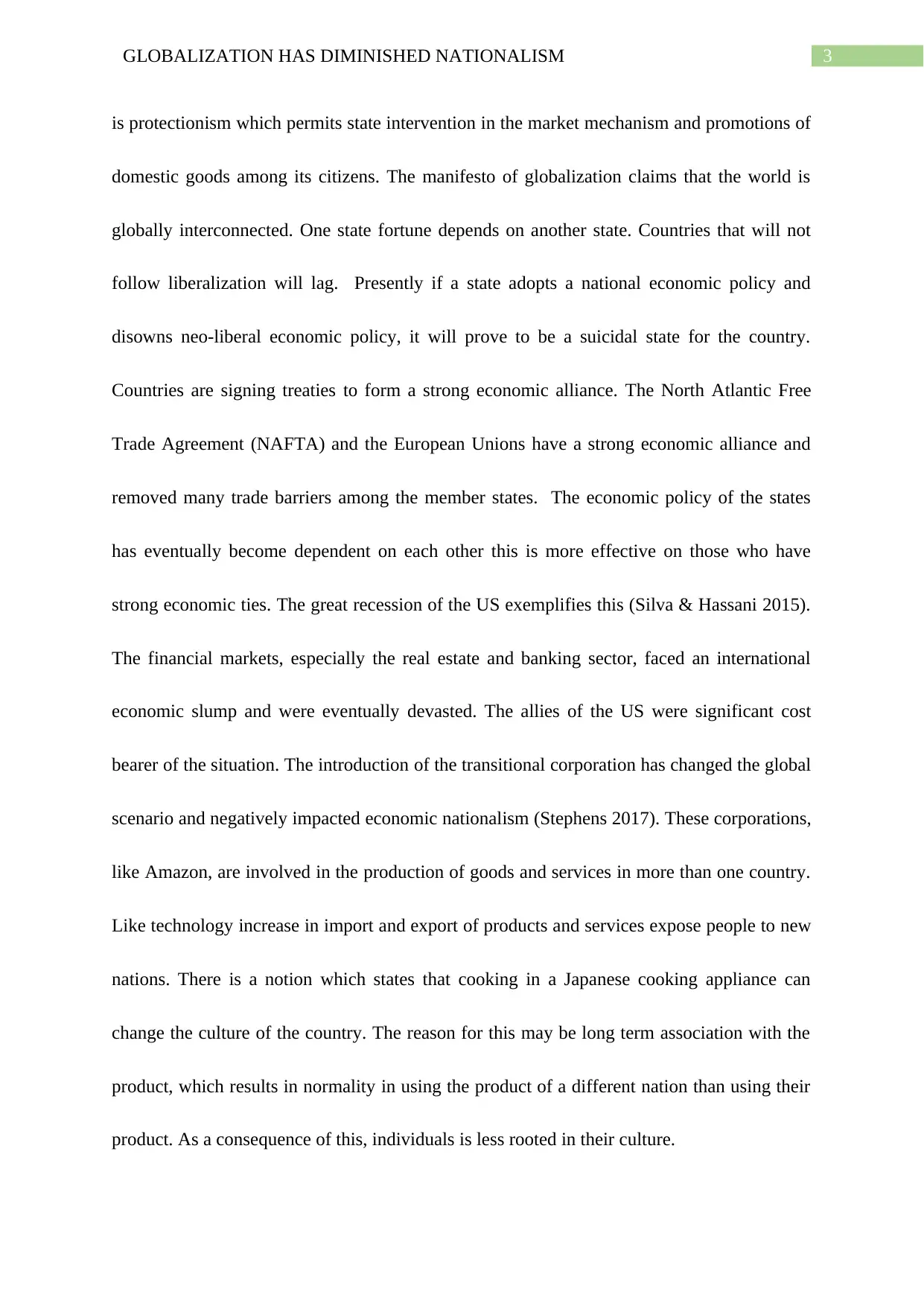
3GLOBALIZATION HAS DIMINISHED NATIONALISM
is protectionism which permits state intervention in the market mechanism and promotions of
domestic goods among its citizens. The manifesto of globalization claims that the world is
globally interconnected. One state fortune depends on another state. Countries that will not
follow liberalization will lag. Presently if a state adopts a national economic policy and
disowns neo-liberal economic policy, it will prove to be a suicidal state for the country.
Countries are signing treaties to form a strong economic alliance. The North Atlantic Free
Trade Agreement (NAFTA) and the European Unions have a strong economic alliance and
removed many trade barriers among the member states. The economic policy of the states
has eventually become dependent on each other this is more effective on those who have
strong economic ties. The great recession of the US exemplifies this (Silva & Hassani 2015).
The financial markets, especially the real estate and banking sector, faced an international
economic slump and were eventually devasted. The allies of the US were significant cost
bearer of the situation. The introduction of the transitional corporation has changed the global
scenario and negatively impacted economic nationalism (Stephens 2017). These corporations,
like Amazon, are involved in the production of goods and services in more than one country.
Like technology increase in import and export of products and services expose people to new
nations. There is a notion which states that cooking in a Japanese cooking appliance can
change the culture of the country. The reason for this may be long term association with the
product, which results in normality in using the product of a different nation than using their
product. As a consequence of this, individuals is less rooted in their culture.
is protectionism which permits state intervention in the market mechanism and promotions of
domestic goods among its citizens. The manifesto of globalization claims that the world is
globally interconnected. One state fortune depends on another state. Countries that will not
follow liberalization will lag. Presently if a state adopts a national economic policy and
disowns neo-liberal economic policy, it will prove to be a suicidal state for the country.
Countries are signing treaties to form a strong economic alliance. The North Atlantic Free
Trade Agreement (NAFTA) and the European Unions have a strong economic alliance and
removed many trade barriers among the member states. The economic policy of the states
has eventually become dependent on each other this is more effective on those who have
strong economic ties. The great recession of the US exemplifies this (Silva & Hassani 2015).
The financial markets, especially the real estate and banking sector, faced an international
economic slump and were eventually devasted. The allies of the US were significant cost
bearer of the situation. The introduction of the transitional corporation has changed the global
scenario and negatively impacted economic nationalism (Stephens 2017). These corporations,
like Amazon, are involved in the production of goods and services in more than one country.
Like technology increase in import and export of products and services expose people to new
nations. There is a notion which states that cooking in a Japanese cooking appliance can
change the culture of the country. The reason for this may be long term association with the
product, which results in normality in using the product of a different nation than using their
product. As a consequence of this, individuals is less rooted in their culture.
Secure Best Marks with AI Grader
Need help grading? Try our AI Grader for instant feedback on your assignments.
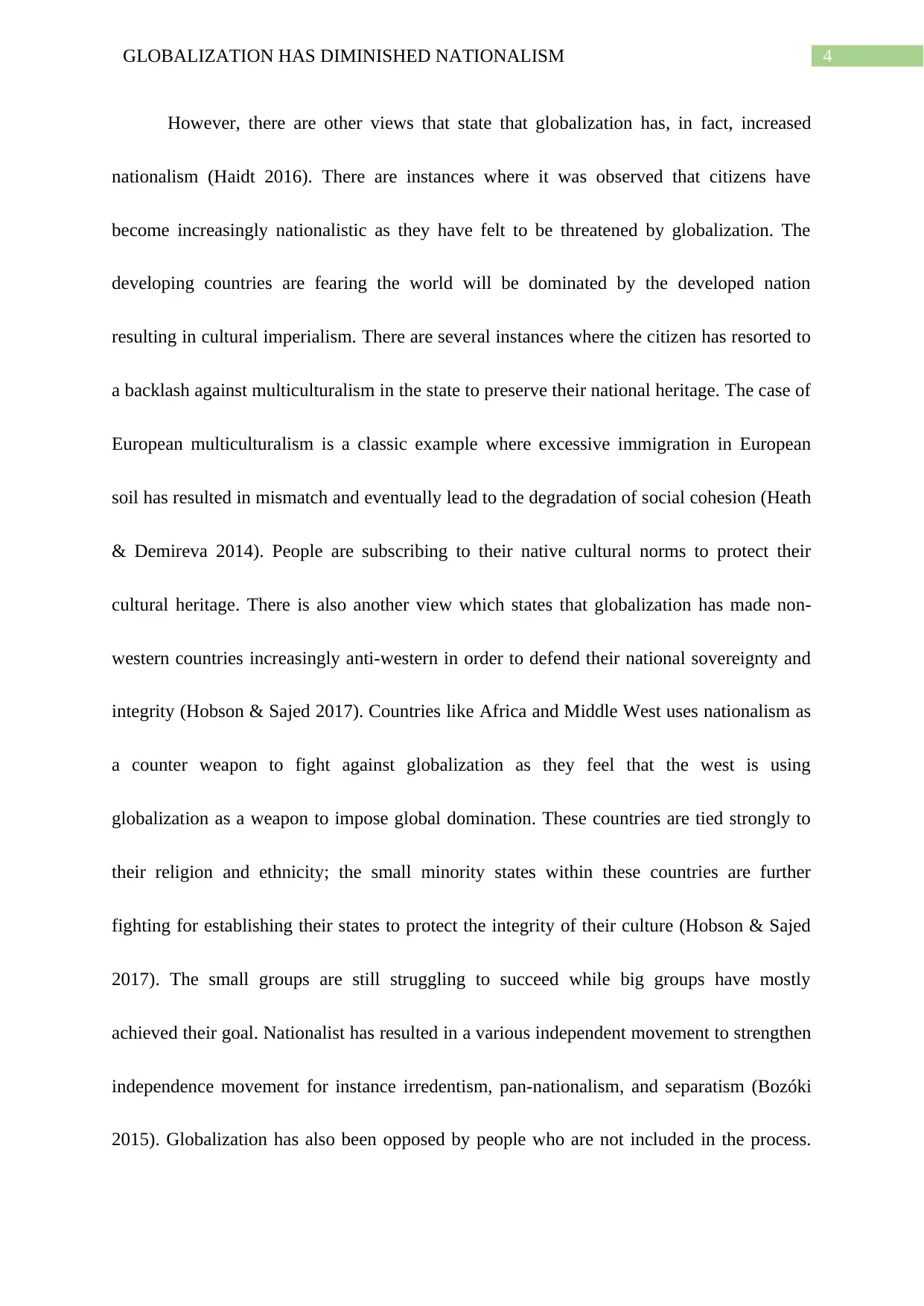
4GLOBALIZATION HAS DIMINISHED NATIONALISM
However, there are other views that state that globalization has, in fact, increased
nationalism (Haidt 2016). There are instances where it was observed that citizens have
become increasingly nationalistic as they have felt to be threatened by globalization. The
developing countries are fearing the world will be dominated by the developed nation
resulting in cultural imperialism. There are several instances where the citizen has resorted to
a backlash against multiculturalism in the state to preserve their national heritage. The case of
European multiculturalism is a classic example where excessive immigration in European
soil has resulted in mismatch and eventually lead to the degradation of social cohesion (Heath
& Demireva 2014). People are subscribing to their native cultural norms to protect their
cultural heritage. There is also another view which states that globalization has made non-
western countries increasingly anti-western in order to defend their national sovereignty and
integrity (Hobson & Sajed 2017). Countries like Africa and Middle West uses nationalism as
a counter weapon to fight against globalization as they feel that the west is using
globalization as a weapon to impose global domination. These countries are tied strongly to
their religion and ethnicity; the small minority states within these countries are further
fighting for establishing their states to protect the integrity of their culture (Hobson & Sajed
2017). The small groups are still struggling to succeed while big groups have mostly
achieved their goal. Nationalist has resulted in a various independent movement to strengthen
independence movement for instance irredentism, pan-nationalism, and separatism (Bozóki
2015). Globalization has also been opposed by people who are not included in the process.
However, there are other views that state that globalization has, in fact, increased
nationalism (Haidt 2016). There are instances where it was observed that citizens have
become increasingly nationalistic as they have felt to be threatened by globalization. The
developing countries are fearing the world will be dominated by the developed nation
resulting in cultural imperialism. There are several instances where the citizen has resorted to
a backlash against multiculturalism in the state to preserve their national heritage. The case of
European multiculturalism is a classic example where excessive immigration in European
soil has resulted in mismatch and eventually lead to the degradation of social cohesion (Heath
& Demireva 2014). People are subscribing to their native cultural norms to protect their
cultural heritage. There is also another view which states that globalization has made non-
western countries increasingly anti-western in order to defend their national sovereignty and
integrity (Hobson & Sajed 2017). Countries like Africa and Middle West uses nationalism as
a counter weapon to fight against globalization as they feel that the west is using
globalization as a weapon to impose global domination. These countries are tied strongly to
their religion and ethnicity; the small minority states within these countries are further
fighting for establishing their states to protect the integrity of their culture (Hobson & Sajed
2017). The small groups are still struggling to succeed while big groups have mostly
achieved their goal. Nationalist has resulted in a various independent movement to strengthen
independence movement for instance irredentism, pan-nationalism, and separatism (Bozóki
2015). Globalization has also been opposed by people who are not included in the process.
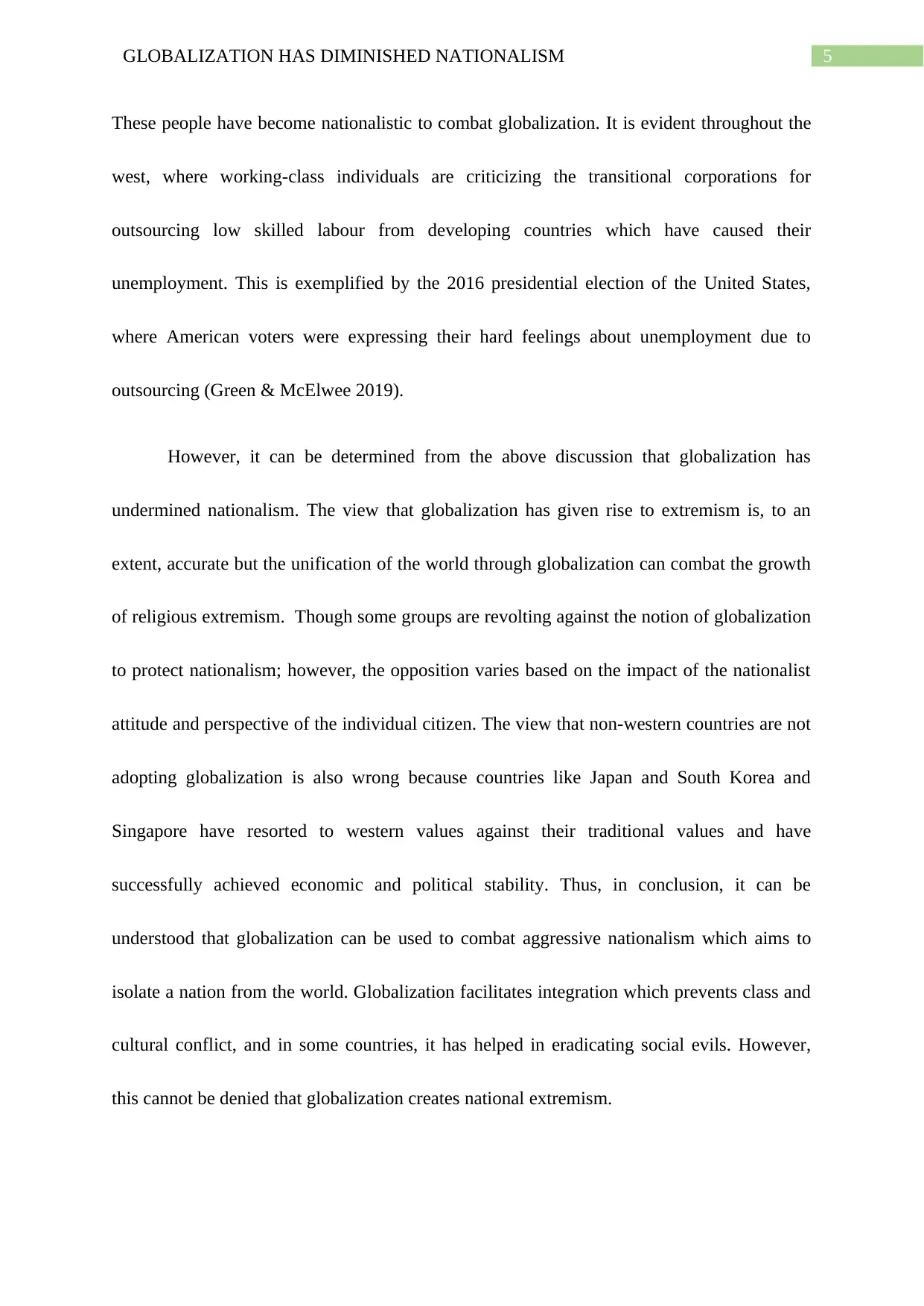
5GLOBALIZATION HAS DIMINISHED NATIONALISM
These people have become nationalistic to combat globalization. It is evident throughout the
west, where working-class individuals are criticizing the transitional corporations for
outsourcing low skilled labour from developing countries which have caused their
unemployment. This is exemplified by the 2016 presidential election of the United States,
where American voters were expressing their hard feelings about unemployment due to
outsourcing (Green & McElwee 2019).
However, it can be determined from the above discussion that globalization has
undermined nationalism. The view that globalization has given rise to extremism is, to an
extent, accurate but the unification of the world through globalization can combat the growth
of religious extremism. Though some groups are revolting against the notion of globalization
to protect nationalism; however, the opposition varies based on the impact of the nationalist
attitude and perspective of the individual citizen. The view that non-western countries are not
adopting globalization is also wrong because countries like Japan and South Korea and
Singapore have resorted to western values against their traditional values and have
successfully achieved economic and political stability. Thus, in conclusion, it can be
understood that globalization can be used to combat aggressive nationalism which aims to
isolate a nation from the world. Globalization facilitates integration which prevents class and
cultural conflict, and in some countries, it has helped in eradicating social evils. However,
this cannot be denied that globalization creates national extremism.
These people have become nationalistic to combat globalization. It is evident throughout the
west, where working-class individuals are criticizing the transitional corporations for
outsourcing low skilled labour from developing countries which have caused their
unemployment. This is exemplified by the 2016 presidential election of the United States,
where American voters were expressing their hard feelings about unemployment due to
outsourcing (Green & McElwee 2019).
However, it can be determined from the above discussion that globalization has
undermined nationalism. The view that globalization has given rise to extremism is, to an
extent, accurate but the unification of the world through globalization can combat the growth
of religious extremism. Though some groups are revolting against the notion of globalization
to protect nationalism; however, the opposition varies based on the impact of the nationalist
attitude and perspective of the individual citizen. The view that non-western countries are not
adopting globalization is also wrong because countries like Japan and South Korea and
Singapore have resorted to western values against their traditional values and have
successfully achieved economic and political stability. Thus, in conclusion, it can be
understood that globalization can be used to combat aggressive nationalism which aims to
isolate a nation from the world. Globalization facilitates integration which prevents class and
cultural conflict, and in some countries, it has helped in eradicating social evils. However,
this cannot be denied that globalization creates national extremism.
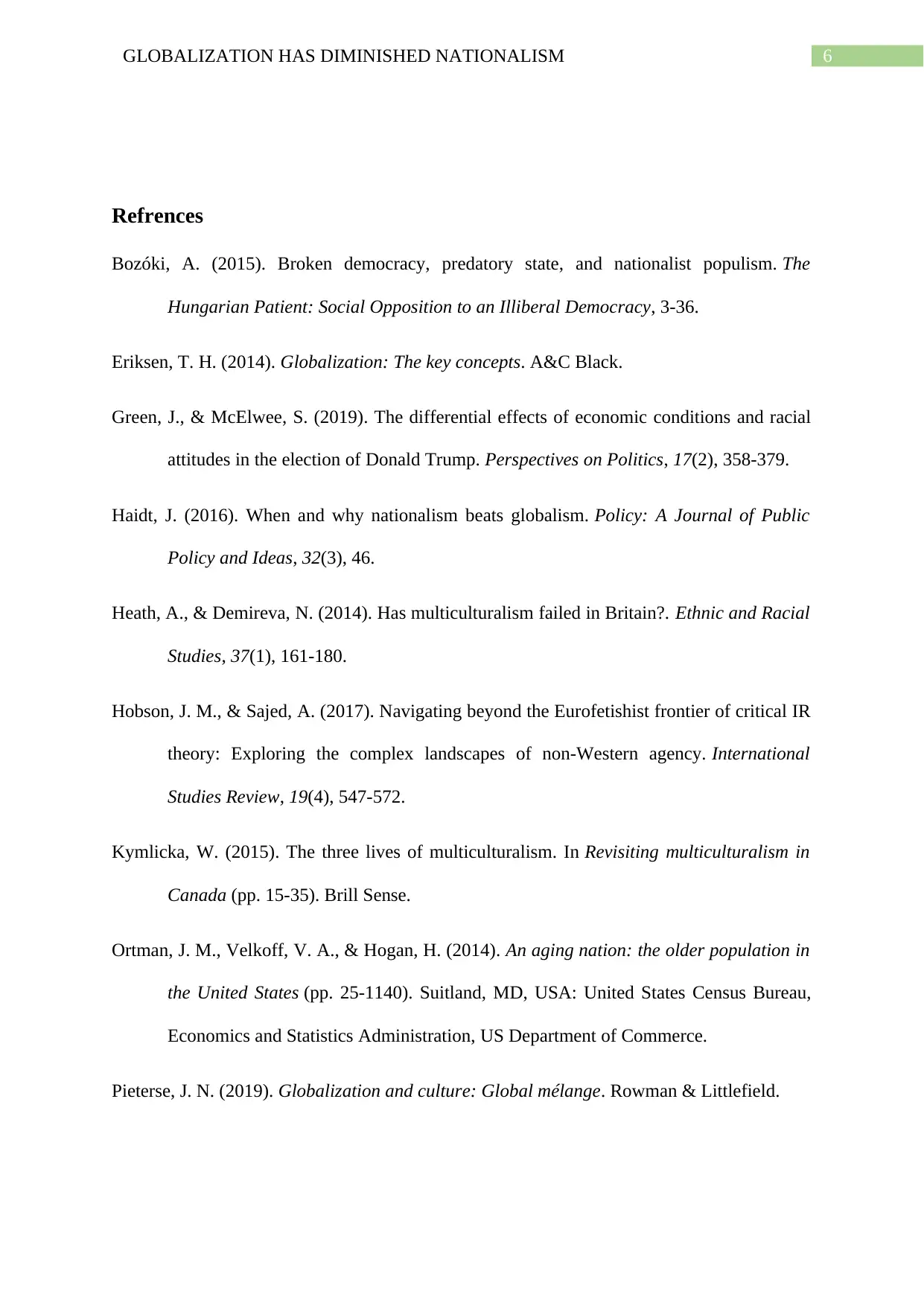
6GLOBALIZATION HAS DIMINISHED NATIONALISM
Refrences
Bozóki, A. (2015). Broken democracy, predatory state, and nationalist populism. The
Hungarian Patient: Social Opposition to an Illiberal Democracy, 3-36.
Eriksen, T. H. (2014). Globalization: The key concepts. A&C Black.
Green, J., & McElwee, S. (2019). The differential effects of economic conditions and racial
attitudes in the election of Donald Trump. Perspectives on Politics, 17(2), 358-379.
Haidt, J. (2016). When and why nationalism beats globalism. Policy: A Journal of Public
Policy and Ideas, 32(3), 46.
Heath, A., & Demireva, N. (2014). Has multiculturalism failed in Britain?. Ethnic and Racial
Studies, 37(1), 161-180.
Hobson, J. M., & Sajed, A. (2017). Navigating beyond the Eurofetishist frontier of critical IR
theory: Exploring the complex landscapes of non-Western agency. International
Studies Review, 19(4), 547-572.
Kymlicka, W. (2015). The three lives of multiculturalism. In Revisiting multiculturalism in
Canada (pp. 15-35). Brill Sense.
Ortman, J. M., Velkoff, V. A., & Hogan, H. (2014). An aging nation: the older population in
the United States (pp. 25-1140). Suitland, MD, USA: United States Census Bureau,
Economics and Statistics Administration, US Department of Commerce.
Pieterse, J. N. (2019). Globalization and culture: Global mélange. Rowman & Littlefield.
Refrences
Bozóki, A. (2015). Broken democracy, predatory state, and nationalist populism. The
Hungarian Patient: Social Opposition to an Illiberal Democracy, 3-36.
Eriksen, T. H. (2014). Globalization: The key concepts. A&C Black.
Green, J., & McElwee, S. (2019). The differential effects of economic conditions and racial
attitudes in the election of Donald Trump. Perspectives on Politics, 17(2), 358-379.
Haidt, J. (2016). When and why nationalism beats globalism. Policy: A Journal of Public
Policy and Ideas, 32(3), 46.
Heath, A., & Demireva, N. (2014). Has multiculturalism failed in Britain?. Ethnic and Racial
Studies, 37(1), 161-180.
Hobson, J. M., & Sajed, A. (2017). Navigating beyond the Eurofetishist frontier of critical IR
theory: Exploring the complex landscapes of non-Western agency. International
Studies Review, 19(4), 547-572.
Kymlicka, W. (2015). The three lives of multiculturalism. In Revisiting multiculturalism in
Canada (pp. 15-35). Brill Sense.
Ortman, J. M., Velkoff, V. A., & Hogan, H. (2014). An aging nation: the older population in
the United States (pp. 25-1140). Suitland, MD, USA: United States Census Bureau,
Economics and Statistics Administration, US Department of Commerce.
Pieterse, J. N. (2019). Globalization and culture: Global mélange. Rowman & Littlefield.
Paraphrase This Document
Need a fresh take? Get an instant paraphrase of this document with our AI Paraphraser
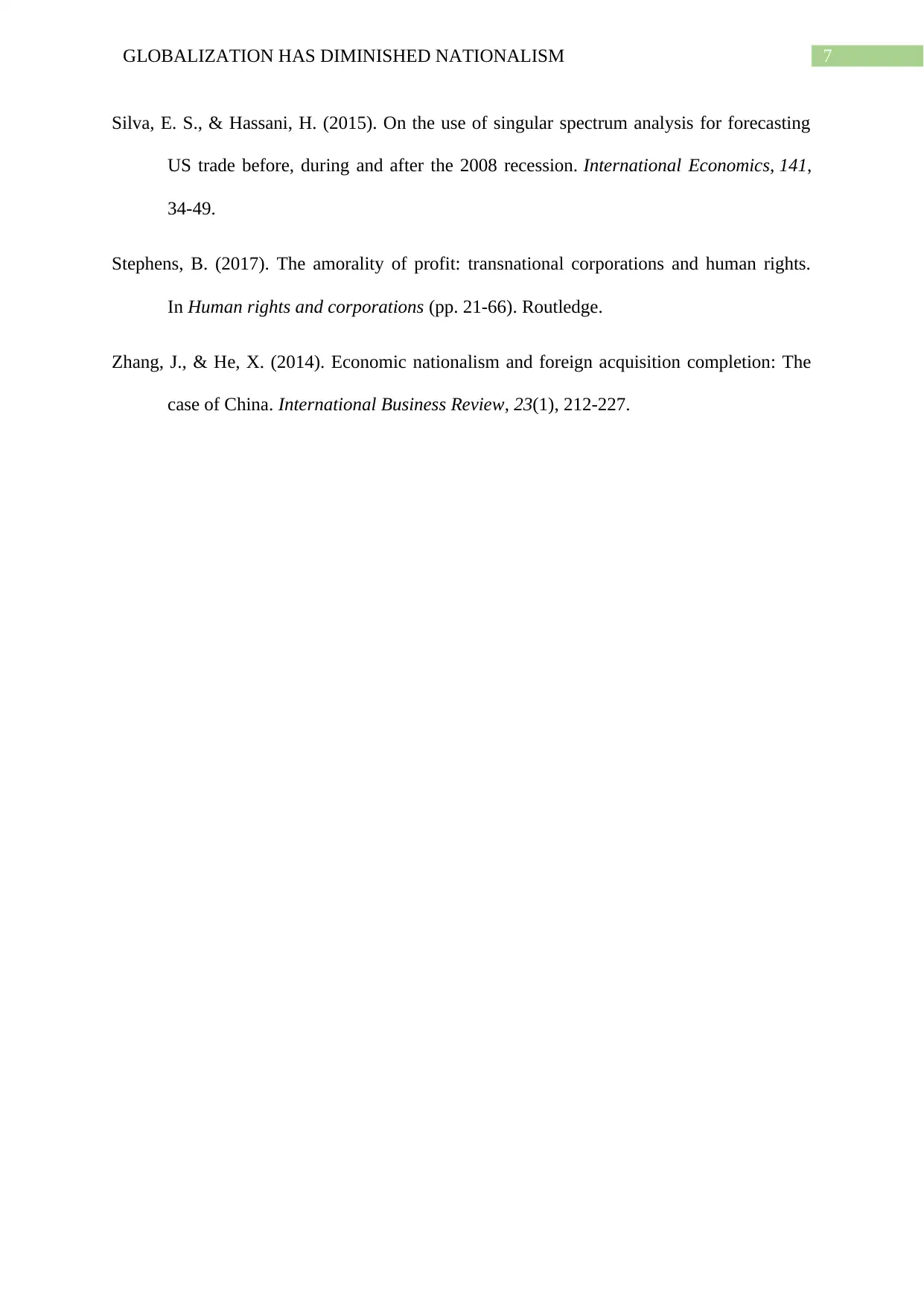
7GLOBALIZATION HAS DIMINISHED NATIONALISM
Silva, E. S., & Hassani, H. (2015). On the use of singular spectrum analysis for forecasting
US trade before, during and after the 2008 recession. International Economics, 141,
34-49.
Stephens, B. (2017). The amorality of profit: transnational corporations and human rights.
In Human rights and corporations (pp. 21-66). Routledge.
Zhang, J., & He, X. (2014). Economic nationalism and foreign acquisition completion: The
case of China. International Business Review, 23(1), 212-227.
Silva, E. S., & Hassani, H. (2015). On the use of singular spectrum analysis for forecasting
US trade before, during and after the 2008 recession. International Economics, 141,
34-49.
Stephens, B. (2017). The amorality of profit: transnational corporations and human rights.
In Human rights and corporations (pp. 21-66). Routledge.
Zhang, J., & He, X. (2014). Economic nationalism and foreign acquisition completion: The
case of China. International Business Review, 23(1), 212-227.
1 out of 8
Related Documents
Your All-in-One AI-Powered Toolkit for Academic Success.
+13062052269
info@desklib.com
Available 24*7 on WhatsApp / Email
![[object Object]](/_next/static/media/star-bottom.7253800d.svg)
Unlock your academic potential
© 2024 | Zucol Services PVT LTD | All rights reserved.





